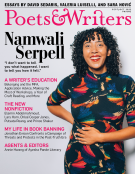Animals narrate every story in Talia Lakshmi Kolluri’s debut collection, What We Fed to the Manticore (Tin House, September 2022). A blue whale searches for his beloved; a starving polar bear hunts a seal among melting Arctic ice. Across the book, animals struggle with loss—of their companions, their habitats, their ways of life—because of climate change or human intervention. In each story, Kolluri attempts to inhabit the consciousness of its animal narrator and stay true to their perceptual abilities; a pigeon, for example, tells time by consulting her inner “sun compass.” The resulting stories offer fresh observations of the world while evoking the common desire among living creatures to survive and protect what is precious.

Talia Lakshmi Kolluri, author of What We Fed to the Manticore. (Credit: Sarah Deragon)
When Kolluri started submitting to journals, she felt daunted by the idea of searching for magazines receptive to work narrated by animals. Kolluri instead submitted anywhere open to simultaneous submissions. “I understand now that this kind of approach really overwhelms the submissions queue readers and [that] the students and editors who often staff literary magazines do so primarily as a labor of love,” she says. “But I wanted to say yes to myself [and that] meant believing that every time a journal said, ‘Send us your best work,’ my story fit that definition.” With this strategy Kolluri published her story about a pack of sled dogs in Greenland, “The Hunted, the Haunted, the Hungry, the Tame,” with the Minnesota Review after it was rejected sixty-six times by other journals. Founded in Minnesota in 1960, the biannual journal features poetry and fiction, as well as critical work about the humanities. The last issue included Henry Ivry’s critical study of Black ecology alongside fiction by Emma Walkiewicz and poetry by Alexis Tyla Roberts. The editors accept submissions of critical work year-round and creative work until October 15.
Place plays a central role in Kolluri’s book, so her title story, which follows a tiger living in the Sundarbans, was at home in Ecotone, a print biannual that focuses on place-based writing. The editors write, “An ecotone is a transition zone between two adjacent ecological communities, containing the characteristic species of each. It is therefore a place of danger or opportunity, a testing ground. The magazine explores the ecotones between landscapes, literary genres, scientific and artistic disciplines, modes of thought.” Edited at the University of North Carolina in Wilmington since 2005, the magazine features poetry, fiction, nonfiction, and art. Submissions in all genres for Ecotone are open until September 2; upcoming issues include a volume themed on the ocean, another on labor.
Kolluri published “The Good Donkey,” about a donkey in a zoo in Gaza, in another place-based publication, the Common. Kolluri was drawn to the periodical’s emphasis on place and work in translation; a recent issue spotlighted a portfolio of Palestinian stories translated from the Arabic. Kolluri also praised editor Jennifer Acker. “She struck that perfect balance of ensuring that I felt I had authorial independence to write the story I wanted to write while still nudging me away from writing into the path of least resistance,” says Kolluri. “[It] resulted in more nuanced character development and a greater understanding of how to write a complex context for a story.” Edited in Amherst, Massachusetts, the Common publishes poetry, fiction, nonfiction, and art in a print biannual and on its website. The journal also offers readings and programs with educational and cultural institutions. Submissions in all genres are open via Submittable until December 1.
Kolluri’s admiration for poet and memoirist Rajiv Mohabir, a former features editor for Southern Humanities Review, led her to regularly read the quarterly. “They have such broad and wide-ranging taste,” she says. She eventually published her story about a wolf shot down by hunters, “A Level of Tolerance,” in the journal. Former editor Caitlin Rae Taylor encouraged Kolluri to “go a bit further in imagining how an animal might frame something both emotionally and intellectually in ways that are different from humans, and take more risks in structur[ing] paragraphs [so as] to build a greater emotional impact.” Housed at Auburn University in Alabama, Southern Humanities Review has showcased poetry, fiction, and nonfiction since 1967. Submissions are open via Submittable until November 1.
After working on What We Fed to the Manticore for ten years and widely submitting, Kolluri is now placing work in some of her dream publications, including Orion, which will publish a story of hers not from her debut. “Orion is a titan in the world of thoughtful nature writing, and I am all-in on their mission to publish work that explores the connection between nature and culture and why good stewardship of the planet is vital to our survival and to art,” she says. Celebrating its fortieth anniversary this year, the print quarterly has featured interviews, poems, stories, and essays by figures such as Jane Goodall and Barbara Kingsolver. As of this writing, Orion’s next submission period has not been set.
Dana Isokawa is the managing editor of the Margins and a contributing editor of Poets & Writers Magazine.








